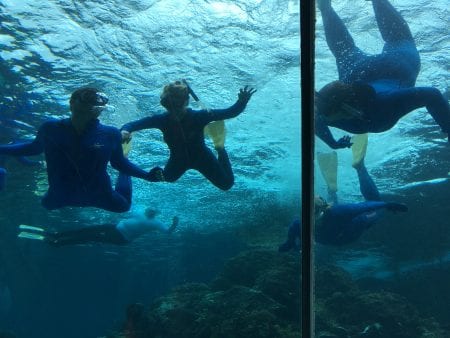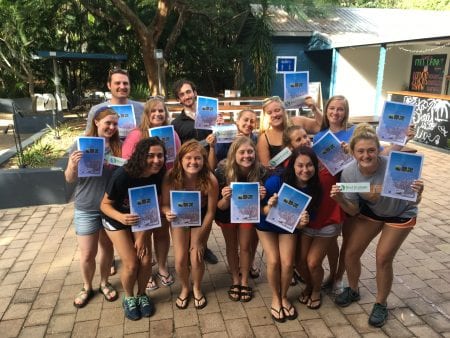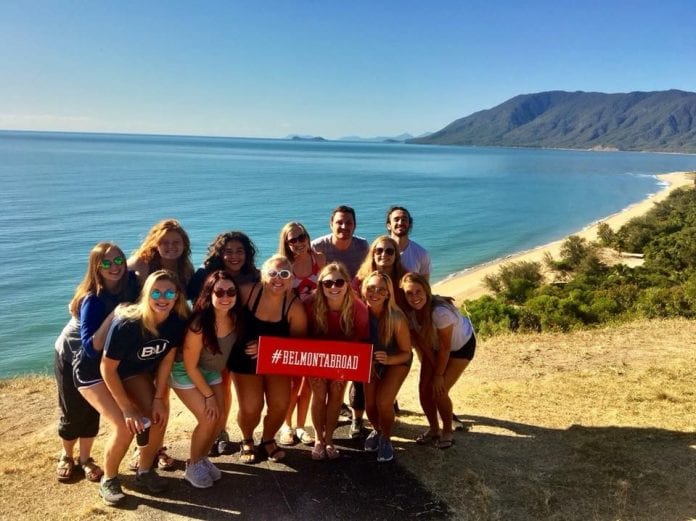A seemingly unexpected combination, a group of Belmont students and two faculty from the College of Sciences and Mathematics traveled to Australia and the Great Barrier Reef this summer to study the poisons of marine animals native to the area and the quantitative reasoning and numeracy applied to the issues of injustice and inequality. While spending time in Australia, students had the opportunity to learn about where and how these native, deadly creatures live, how people co-exist among them and the various threats present to Australian ecosystems–all conversations led by Associate Professor of Chemistry and trip co-leader Dr. Alison Parker through her course, “Chemistry of Poisons.”
Throughout the same conversations, Assistant Professor of Mathematics and fellow trip leader Dr. Brad Schleben engaged students in his “Math of Social Justice” course, an opportunity for students to navigate their ability to question data while confronting the elements of power, privilege and interdependence seen in cross-cultural dynamics. Students had the opportunity to participate in active learning experiences including service projects, discussions with members of both the Quandamooka and Nyawaygi aboriginal communities and exposure to organizations pushing for social awareness and change – all from both a mathematical and human viewpoint.
 For Parker, the opportunity to lead students on a short-term study abroad experience creates a chance to impact their lives far beyond their three week trip. “Students learn more about their own worldview and how to recognize cultural difference and interact with people whose worldview is not the same. Lifelong learning isn’t just about your major and what you see and hear in a classroom, it’s about the confluence of experiences that influence every aspect of life.”
For Parker, the opportunity to lead students on a short-term study abroad experience creates a chance to impact their lives far beyond their three week trip. “Students learn more about their own worldview and how to recognize cultural difference and interact with people whose worldview is not the same. Lifelong learning isn’t just about your major and what you see and hear in a classroom, it’s about the confluence of experiences that influence every aspect of life.”
The group started their three weeks abroad in Brisbane and spent a few nights on North Stradbroke Island at a University of Queensland marine research facility where they learned about the ecology of local waterways and collected data on living systems. After travelling to Townsville to learn about the Great Barrier Reef Marine Park and its management processes, the group embarked on their first Reef EcoLogic Day on Magnetic Island where they discussed their responsibility on threats to the reef. Students had the opportunity for hands-on involvement as they pulled algae off rock and coral, quantifying both the plant mass and roots collected.
Continuing north, the group went to Cairns via Mungulla Station, an experience dedicated to protecting wetlands from environmental threats, and planted trees as part of the group’s restoration project. Parker took a group of students to the area last summer for the same project and the team was able to see the progress a year of work has created.
From there, the team spent a day on the reef experiencing the health and beauty of the open ocean. They also explored Daintree Rainforest and River before visiting Green Collar, an environmental data science firm that specializes in collecting, analyzing and modeling data to help agricultural enterprises and land owners maximize sustainable practices.
 Belmont student and trip participant Katelyn Bosse said she had been interested in studying abroad since first hearing about the opportunity her freshman year. Though the trip’s countless experiences will forever be some of her favorite memories, Bosse said it was her fellow students and the ways in which they bonded that she’s most grateful for. “I was able to snorkel in the Great Barrier Reef and hold koalas with people I just met — only two weeks ago,” she said. “We are all from different backgrounds and majors, but we became close so fast, and it will be fun to run into each other on campus and share our stories.”
Belmont student and trip participant Katelyn Bosse said she had been interested in studying abroad since first hearing about the opportunity her freshman year. Though the trip’s countless experiences will forever be some of her favorite memories, Bosse said it was her fellow students and the ways in which they bonded that she’s most grateful for. “I was able to snorkel in the Great Barrier Reef and hold koalas with people I just met — only two weeks ago,” she said. “We are all from different backgrounds and majors, but we became close so fast, and it will be fun to run into each other on campus and share our stories.”
Beyond her new friendships, Bosse said she also walked away with a new found appreciation for cultures different than her own. “As tourists in other countries, we often visit the building and sites, but we don’t completely engage in the new culture. This trip was so unique in that we dug in and made connections. We were engaged and open-minded. I will talk about these three weeks-snorkeling, surfing, gorge walking with whales and dolphins and learning about coral reefs, marine life and aboriginal culture-forever.”



